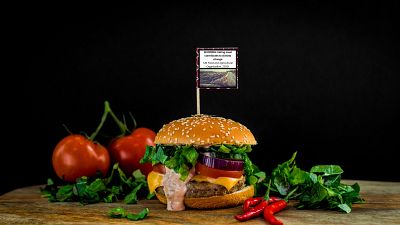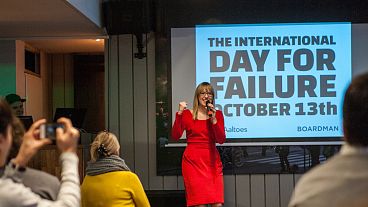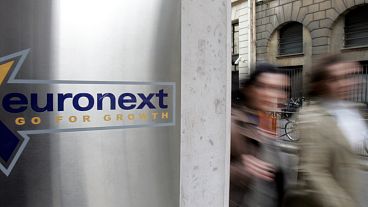Umiami is the latest French meat alternative startup aiming at the European market, but it’s a competitive field.
French food tech company Umiami secured an impressive €32.5 million in funding at the beginning of the month. With this latest round of financing, the total funds raised by the company, which was founded just three years ago, now exceed €100 million.
The company has set its sights on expanding its presence across Europe, capitalising on its existing distribution in Switzerland, Belgium, the Netherlands, Spain, and Italy, primarily through a business-to-business (B2B) strategy targeting hospitality professionals.
“Our strategy is to deploy simultaneously in different regions,” Umiami told Euronews Business, explaining that the UK, Germany and Netherlands were considered the most “mature” markets for their product.
The company is also making a foray into the US market by opening an office in Chicago.
Umiami bet on a technique mimicking the texture of a meat fillet that they called “umisation” - the company’s “own unique protein texturing technology,” it said.
It also claims to have silenced the critics of processed food by using fewer than 10 ingredients and no “controversial” preservatives in the finished product.
Additionally, it proudly waves its “100% made in France" flag, tapping into the current trend of consumers preferring locally sourced products, as long as they can afford it.
"We are extremely proud of the huge success of our Series A round, and of the confidence that our investors and partners have placed in us,” said the founders in a statement.
A Series A round typically refers to a company's first significant round of venture capital financing, after the seed round, which is usually funded by the company's founders, friends, and family.
This fundraising achievement reflects France's broader efforts to revitalise its industrial landscape. The country initiated a €54 billion investment plan in 2021, aimed at positioning France as a global economic leader by 2030 through a series of calls for proposals.
Despite significant media attention - including from Euronews itself - it's important to note that the plant-based market remains niche, and its growth has slowed on a global scale, as explained by Matteo Neri, a food processing expert at market analysis firm Xerfi.
“The plant-based products market, all of them - including plant-based kinds of milk, desserts and meat alternatives - equals the margarine market in France,” he told Euronews Business.
“When you start with such a small market, of course, you have a two-digit growth rate, but it faded in 2022,” he added.
Au revoir meat, bonjour veggie products
Almost half of French households had a flexitarian member (someone who primarily eats a vegetarian diet but occasionally eats meat) in 2021 compared to a quarter just six years ago, according to Kantar World Panel, and it's representative of a Western global trend.
With the number of potential consumers growing, it’s no surprise that companies are trying to get the lion's share of the vegan and vegetarian products market, and several French startups are entering the fray.
Happyvore, another French vegan-specialised company, opened a factory in the centre of France in June this year and distributes its products through different restaurant chains.
Specialised in bacon-imitating products, La Vie Foods has also considerably expanded in recent years, with a very visible marketing strategy, a partnership with the 440 French Burger King restaurants and €25 million raised in 2022.
The startup counts almost 4,600 partner retailers in Europe
Around 40% of French citizens would like to consume more plant-based products, according to a survey conducted in 2023, but it doesn’t necessarily translate in real life.
Humans are invariably full of contradictions, Neri noted.
“There are significant discrepancies between statements of intent and actual purchases,” he explained.
The paradox of plant-based food
The Good Food Institute Europe analysis showed a 21% growth between 2020 and 2022 for plant-based products and the sector reached a record value of €5.8 billion.
However, the question arises: who will ultimately benefit from this growth?
French startups, while flourishing, have yet to make a significant global impact. Dominating the plant-based alternatives market on a global scale are major players like Kellogg’s.
One exception is the start-up Beyond Meat, which announced its initial public offering in 2019 but has faced market challenges in recent months.
Furthermore, even as consumers seek more plant-based options, they may not necessarily turn to meat alternatives, Neri said.
“One of the strongest competitors to plant-based alternatives is not meat, but plants,” he explained.
The Netherlands, a central hub for the food-processing sector, shows a strong inclination towards these products. The UK and Germany are also promising markets.
Meanwhile, other countries like France and Spain traditionally hold meal times and the meal itself as sacred. More than half of French people also show distrust in food industries whereas Italy, the Netherlands and Spain have a rate of around 35%.
This distinctive market landscape is a key factor driving French startups to expand into the European market rather than focus solely on the national one.



